Please log in to read this in our online viewer!
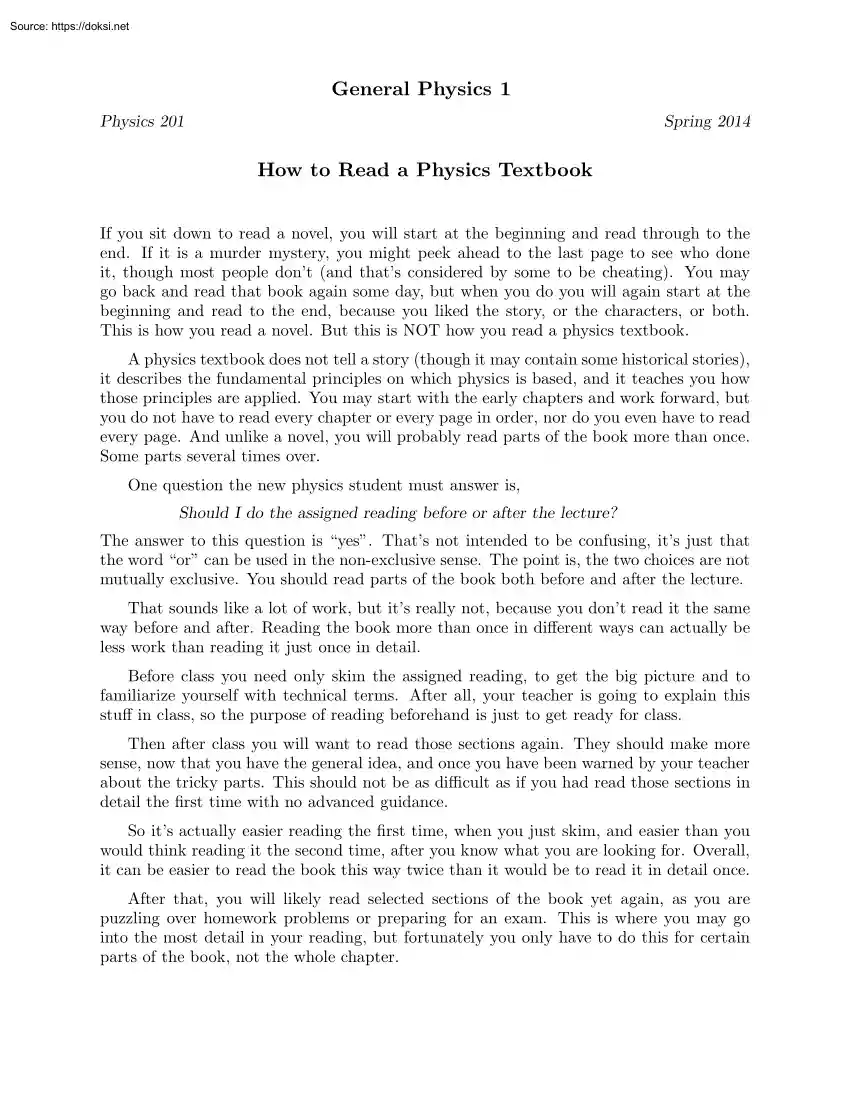
Please log in to read this in our online viewer!
No comments yet. You can be the first!
What did others read after this?
Content extract
General Physics 1 Physics 201 Spring 2014 How to Read a Physics Textbook If you sit down to read a novel, you will start at the beginning and read through to the end. If it is a murder mystery, you might peek ahead to the last page to see who done it, though most people don’t (and that’s considered by some to be cheating). You may go back and read that book again some day, but when you do you will again start at the beginning and read to the end, because you liked the story, or the characters, or both. This is how you read a novel. But this is NOT how you read a physics textbook A physics textbook does not tell a story (though it may contain some historical stories), it describes the fundamental principles on which physics is based, and it teaches you how those principles are applied. You may start with the early chapters and work forward, but you do not have to read every chapter or every page in order, nor do you even have to read every page. And unlike a novel, you will
probably read parts of the book more than once Some parts several times over. One question the new physics student must answer is, Should I do the assigned reading before or after the lecture? The answer to this question is “yes”. That’s not intended to be confusing, it’s just that the word “or” can be used in the non-exclusive sense. The point is, the two choices are not mutually exclusive. You should read parts of the book both before and after the lecture That sounds like a lot of work, but it’s really not, because you don’t read it the same way before and after. Reading the book more than once in different ways can actually be less work than reading it just once in detail. Before class you need only skim the assigned reading, to get the big picture and to familiarize yourself with technical terms. After all, your teacher is going to explain this stuff in class, so the purpose of reading beforehand is just to get ready for class. Then after class you will want to
read those sections again. They should make more sense, now that you have the general idea, and once you have been warned by your teacher about the tricky parts. This should not be as difficult as if you had read those sections in detail the first time with no advanced guidance. So it’s actually easier reading the first time, when you just skim, and easier than you would think reading it the second time, after you know what you are looking for. Overall, it can be easier to read the book this way twice than it would be to read it in detail once. After that, you will likely read selected sections of the book yet again, as you are puzzling over homework problems or preparing for an exam. This is where you may go into the most detail in your reading, but fortunately you only have to do this for certain parts of the book, not the whole chapter. Page 2 Many physics text books have all sorts of extra “features” besides the regular text. They have worked example problems or
conceptual examples, or hints on how to work particular kinds of problems. Unless these extra boxes or sidebars look interesting or are easy to understand, then you can skip them on your first reading. Conceptual examples can be helpful for preparing for class, but the examples of worked homework problems are better saved for the second reading. The problem solving tips make more sense when you are working homework problems, so you can save those for later too. Just don’t forget to come back to them when the time is right. One feature that most good physics textbooks now have is a “Summary” section at the end of each chapter. It is a good idea to read through this section on your first reading Even if you don’t understand it all, you will get an outline of what the chapter is about, and you will see the most important technical terms used in the chapter. Reading this section before class will help you digest what the teacher says in class, and might give you ideas for good
questions to ask during class. In general, when you are skimming the readings before class and something does not make sense, don’t worry about it, and don’t put much effort into understanding it (yet). What you just learned is not that particular topic, but that you want to pay attention to that topic in class, and maybe even ask questions about it if the teacher does not clear up your confusion. You might want to write something in your notebook to remind you of it for class. Reading a physics textbook is definitely not like reading a novel. But once you learn how it’s done, you should find that you can use your textbook to prepare for class, and to work homework problems, without having to read everything over and over again deeply. You will also be more organized in how you approach learning each new topic. But just like reading a crime novel, all of the mysteries should be cleared up by the time you are done
probably read parts of the book more than once Some parts several times over. One question the new physics student must answer is, Should I do the assigned reading before or after the lecture? The answer to this question is “yes”. That’s not intended to be confusing, it’s just that the word “or” can be used in the non-exclusive sense. The point is, the two choices are not mutually exclusive. You should read parts of the book both before and after the lecture That sounds like a lot of work, but it’s really not, because you don’t read it the same way before and after. Reading the book more than once in different ways can actually be less work than reading it just once in detail. Before class you need only skim the assigned reading, to get the big picture and to familiarize yourself with technical terms. After all, your teacher is going to explain this stuff in class, so the purpose of reading beforehand is just to get ready for class. Then after class you will want to
read those sections again. They should make more sense, now that you have the general idea, and once you have been warned by your teacher about the tricky parts. This should not be as difficult as if you had read those sections in detail the first time with no advanced guidance. So it’s actually easier reading the first time, when you just skim, and easier than you would think reading it the second time, after you know what you are looking for. Overall, it can be easier to read the book this way twice than it would be to read it in detail once. After that, you will likely read selected sections of the book yet again, as you are puzzling over homework problems or preparing for an exam. This is where you may go into the most detail in your reading, but fortunately you only have to do this for certain parts of the book, not the whole chapter. Page 2 Many physics text books have all sorts of extra “features” besides the regular text. They have worked example problems or
conceptual examples, or hints on how to work particular kinds of problems. Unless these extra boxes or sidebars look interesting or are easy to understand, then you can skip them on your first reading. Conceptual examples can be helpful for preparing for class, but the examples of worked homework problems are better saved for the second reading. The problem solving tips make more sense when you are working homework problems, so you can save those for later too. Just don’t forget to come back to them when the time is right. One feature that most good physics textbooks now have is a “Summary” section at the end of each chapter. It is a good idea to read through this section on your first reading Even if you don’t understand it all, you will get an outline of what the chapter is about, and you will see the most important technical terms used in the chapter. Reading this section before class will help you digest what the teacher says in class, and might give you ideas for good
questions to ask during class. In general, when you are skimming the readings before class and something does not make sense, don’t worry about it, and don’t put much effort into understanding it (yet). What you just learned is not that particular topic, but that you want to pay attention to that topic in class, and maybe even ask questions about it if the teacher does not clear up your confusion. You might want to write something in your notebook to remind you of it for class. Reading a physics textbook is definitely not like reading a novel. But once you learn how it’s done, you should find that you can use your textbook to prepare for class, and to work homework problems, without having to read everything over and over again deeply. You will also be more organized in how you approach learning each new topic. But just like reading a crime novel, all of the mysteries should be cleared up by the time you are done
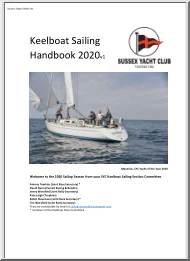
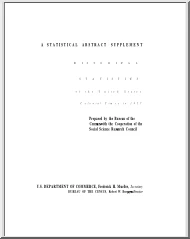
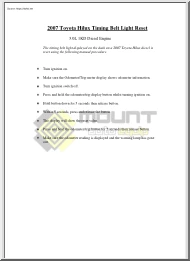
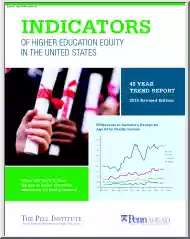
 When reading, most of us just let a story wash over us, getting lost in the world of the book rather than paying attention to the individual elements of the plot or writing. However, in English class, our teachers ask us to look at the mechanics of the writing.
When reading, most of us just let a story wash over us, getting lost in the world of the book rather than paying attention to the individual elements of the plot or writing. However, in English class, our teachers ask us to look at the mechanics of the writing.